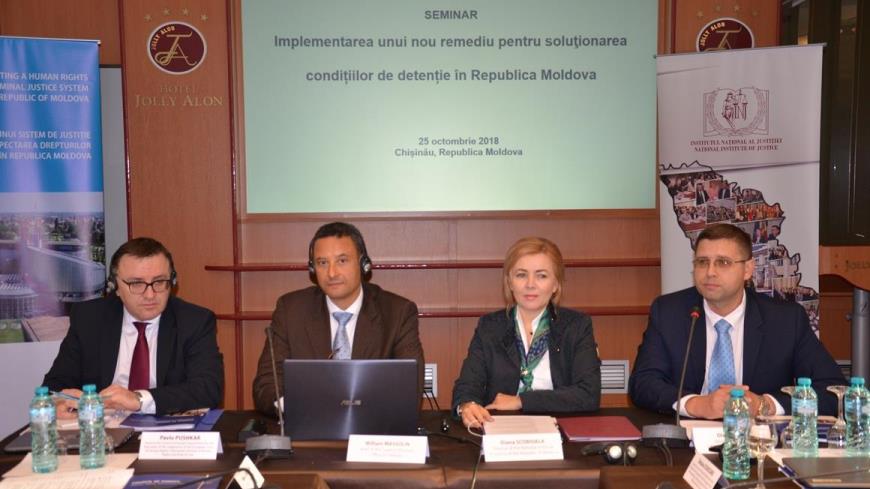On 25 October 2018, over 20 investigative judges and relevant representatives of the National Administration of Penitentiary Institutions of the Republic of Moldova participated in the seminar on the implementation of new domestic remedy to challenge conditions of detention in the Republic of Moldova.
The event was organised under the Council of Europe Programme ”Promoting a human rights compliant justice system in the Republic of Moldova” in cooperation with the National Institute of Justice of the Republic of Moldova and the Council’s Department for the Execution of Judgments of the European Court of Human Rights..
Since 2006, the Council of Europe Committee of Ministers has been examining cases related to poor conditions of detention in Moldova. These cases concern mainly the inhuman and/or degrading treatment suffered by the applicants on account of overcrowding and poor material conditions in establishments under the authority of the Ministries of Justice and of the Interior, the lack of access to adequate medical care and the lack of an effective domestic remedy in both aspects. As of now, about 40 judgements and 25 decisions on poor detention conditions were delivered by the European Court for Human Rights as well as about 100 cases are pending.
”For quite some years now, the Council of Europe has provided assistance to the Republic of Moldova in a number of reforms in the field of justice and human rights area through different cooperation programmes. Today the seminar is a continuation of awareness-raising activities for criminal justice actors. The discussions are going to focus on the effective implementation of new domestic remedy to challenge conditions of detention in the Republic of Moldova. The Council of Europe is committed to continue its support to the Moldovan authorities in the field of justice in general and in particular in the field of criminal justice, which is absolutely essential in our cooperation with the Republic of Moldova”, mentioned in his opening speech William Massolin, Head of the Council of Europe Office in Chisinau.
In 2017 as a response to the Shishanov case, the Parliament of the Republic of Moldova adopted a new law (nr.163) introducing a preventive and compensatory remedy to challenge conditions of detention entering into force on 1 January 2019. The new law empowers the national courts to order the prison’s administration to remedy the shortcomings within a certain deadline, which should not exceed 15 days, and to report back to the court on the measures taken. The compensatory remedy provides for monetary compensation and/or a reduction of sentence for those detained in poor conditions for longer than 10 days.
The Department for the Execution underlined the need to adopt a comprehensive approach to dealing with the problem of poor conditions of detention. For this, cooperation of all domestic actors, notably, policy makers, prison and probation services, social services, prosecutors and judges, would be required. Action of the authorities should aim at elimination of root causes of the poor material conditions of detention as well as at making the new remedy effective in practice.
The same message was reiterated by Diana Scobioala, Head of National Institute of Justice of Moldova: “For some time Moldova has been confronting with this systemic problem of conditions of detention, therefore any remedy that can improve the conditions of detention is welcome. Today the discussions will focus on the new remedy that will enter into force in January 2019. The dialogue will contribute to a better understanding of the new mechanism and will result in a better implementation of the latter.”
During the seminar the participants discussed the practical measures to be taken into consideration while implementing the new remedies, challenges that could be encountered during their implementation, as well as best practices of other Council of Europe member states that had similar experience, such as Bulgaria, represented at the event by the Government Agent of Bulgaria, Ms Maria Dimitrova.
The seminar aimed at raising the awareness of investigating judges and representatives of the penitentiary system on the effective practical application of the abovementioned newly introduced domestic remedy.
The Programme “Promoting a human rights compliant criminal justice system in the Republic of Moldova” is part of the Council of Europe Action Plan for the Republic of Moldova for 2017-2020, and is funded by the Norwegian government.



